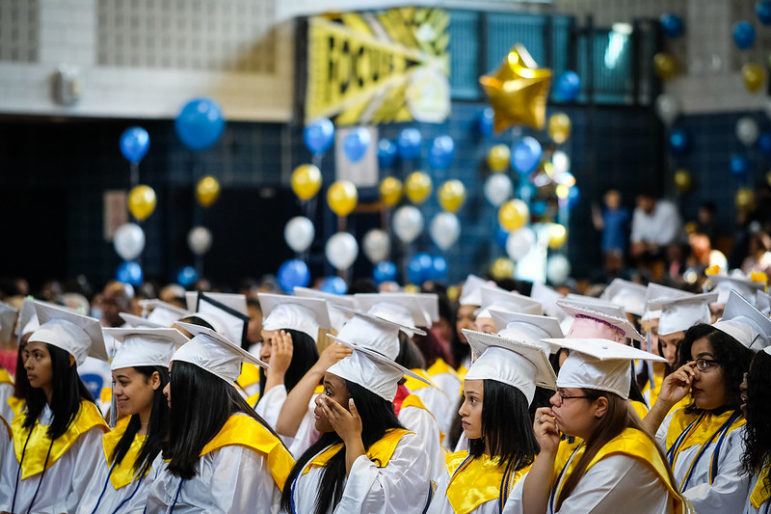The state urged local school districts last year to allow students to continue their studies even after they turn 21, to make up for academic losses during the pandemic. The same policy should be made for this year’s students ‘aging’ out, advocates say.

Edwin J. Torres/Mayoral Photography Office.
A high school graduation in the Bronx in pre-pandemic times.When the pandemic struck last spring, shuttering schools across the city, students were forced to adjust to the disruptions of remote instruction during a crisis. There were struggles to get access to devices or wifi, and many were acutely feeling the loss of the services and support they would usually receive in person.
In response to those challenges, the New York State Education Department (NYSED) issued guidance in June 2020 directing local districts to allow high school students who would otherwise “age out” at the end of the school year to resume working towards their diplomas the following fall. More than 400 students in the city’s schools took advantage of the shift, returning to their studies in September despite having turned 21 during the previous school year — the maximum age that New Yorkers are entitled to attend school in the pre-k-12 system.
Education advocates are now urging the state to make the same move this school year, citing the ongoing impact of the pandemic on learning. While New York City high schools are slated to reopen for in-person instruction next week, those students have been out of their physical classrooms since November, when rising COVID-19 cases prompted a systemwide closure. In January, one out of every five city high schoolers still needed to make up class work from the spring 2020 semester, and a city analysis found that most schools have seen lower attendance rates this year compared to last. Earlier this week, the state announced that it is waiving Regents exam graduation requirements this year in light of the COVID-19 crisis.
“In the face of the incredible hardships caused by COVID-19, districts across the State have had to adjust grading policies and timetables, including giving high schoolers additional time to complete coursework required for graduation,” more than 100 advocacy organizations wrote in a letter to the NYSED this month, calling for the state to “immediately extend” last year’s guidance for aging out students, “so that no student loses the chance to complete high school because of COVID- 19.”
Ashley Grant, a director with Advocates for Children of New York, says they are particularly concerned about the impact of the pandemic on the city’s students of color, as well as English Language Learners (ELLs) and students with disabilities — groups disproportionately represented among students who need more than four years to graduate. Many older high schoolers have already overcome a number of educational barriers before COVID-19, and many work jobs in addition to their studies, she says.
“These are students who already are the most vulnerable and who may have become totally disconnected from school during the pandemic,” Grant says.
Following the state’s change in guidance last year, the city’s Department of Education allowed students who turned 21 during the 2019-2020 school year to resume classes in the fall of 2020 as long as they met certain criteria: that they expected to complete their graduation requirements within a year, that they did not achieve their Individualized Education Program (IEP) goals the previous school year, showed signs of regression, missed instruction and/or services due to the pandemic and did not yet have a postsecondary plan in place.
“No aspect of traditional learning has gone untouched by the pandemic, and we share the urgency of families, educators and advocates to fight for equity and fairness during this crisis, particularly for our most vulnerable students who may be aging out of school,” DOE spokesperson Sarah Casasnovas said in a statement. “We look forward to working with the State to identify solutions to ensure students have the additional time they need to graduate or achieve their IEP goals.”
NYSED officials told City Limits they are reviewing the issue, and “recognize the impact this pandemic has had on some of our most vulnerable students who will age out,” according to a statement.
Grant and other advocates are pushing for both the city and state to publicly issue guidance for students aging out as soon as possible. Last year, the state issued its memo for those students in June, while the city announced its policy even later.
“It was hard to get information out to eligible families in time for young people to take advantage of this opportunity,” she says.










3 thoughts on “Let NYC High Schoolers Who ‘Age Out’ This Year Return Next Fall: Advocates”
So we have hulking 21 year old male high school students mixed in with 14 year old girls. What could possibly go wrong?
you do understand that there have already been 20-year-old high school students before the pandemic, right? and also, things already go wrong in high school with boy and girls the same age mixed together, so why don’t you advocate against all co-ed schools instead?
Yes let them return since these people had no chance this year due to the pandemic. Thank you